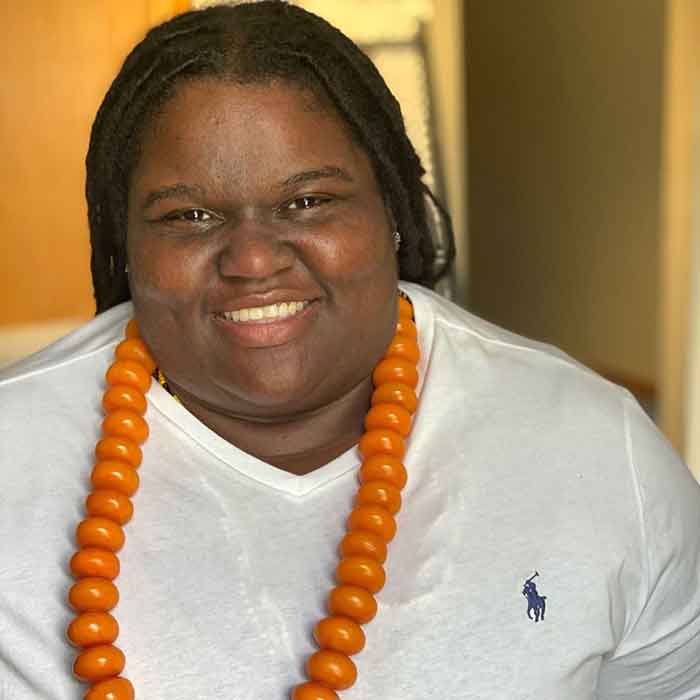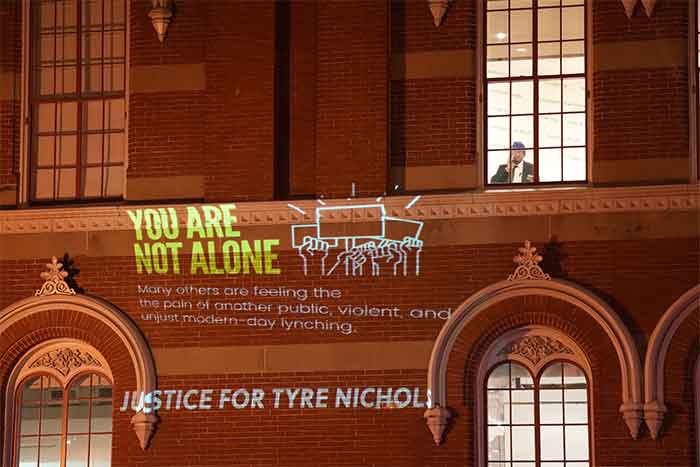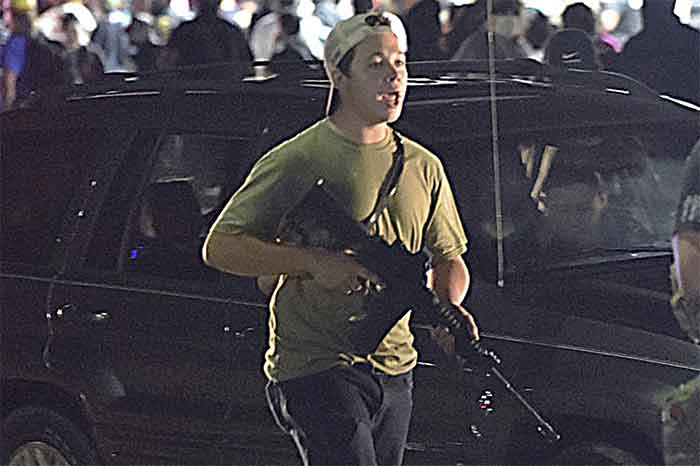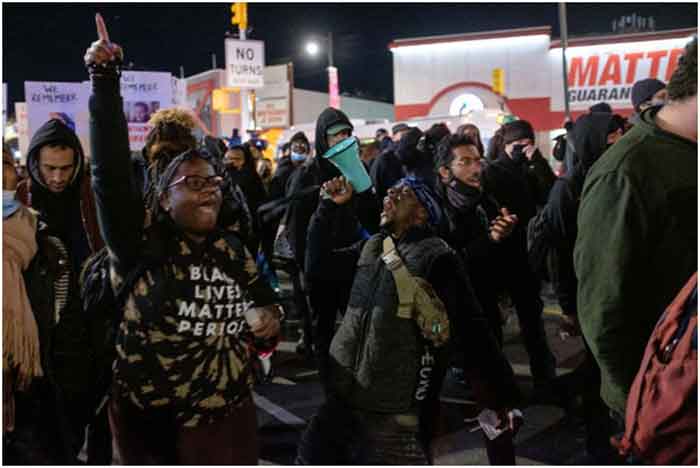
The nationwide uprising against police brutality has completely changed the conversation around policing and safety. The demand to defund police which would have been deemed unthinkable in the mainstream not long ago, but are now being taken up as official policy in towns and cities across the country. At this moment, it is crucial to expand the conversation to include the idea of community control over policing.
In order to do so, I caught up with activist M Adams, who describes community control as “essential coupling” to the demand to defund the police. Although we did touch upon some of the details of how community control would work, the goal of the interview was more to illustrate the importance of the idea. M. Adams is a community organizer and co-executive director of
Freedom Inc. and a leader in the Movement for Black Lives. As a queer Black person, Adams has developed and advocated for a strong intersectional approach in numerous important venues. Adams is a leading figure in the Take Back the Land Movement, she presented before the United Nations for the Convention on Eliminating Racial Discrimination, she is a co-author of Forward from Ferguson and a paper on Black community control over the police, and she is the author of intersectionality theory in Why Killing Unarmed Black folks is a Queer issue.
Q: Let’s begin by asking you to describe the role of the police as a colonial force.
MA: We think it’s extremely important to be scientific in our assessment about what’s causing police brutality. In our assessment, it is because the Black community exists and functions as a colony within the United States. When you use the word “colony”, most people think about one group of people colonizing another group of people in a faraway place, and that is indeed one way of setting up a colony.
What we’re saying is that Black people are an internal colony, not necessarily a different country or nation-state. What defines colonialism is a power dynamic, and as it relates to Black people there are three features.
- There is extraction of wealth and labor, and we can document this from the chattel slavery system to the current day mass We can see the under-employment of Black folks, the precariousness, the displacement. Black people are a hyper-exploited class in the way wealth is extracted from us, our bodies are labor.
- The colony acts as a dumping site for runoff goods; not only do they use our labor to produce or create wealth, but then they also consume the things they think are good and dump the bad ones back on us. We’ve seen that in the recession of 2008, where banks’ exploitative practices like redlining and predatory lending – gendered racial capitalism – put us in a precarious situation where we don’t control anything, land is commodified altogether, and Black people as a class don’t have the ability to house ourselves. Then the banks get the bailouts, get all the money and then they can charge us again, exploiting us another layer.
- In the context of the US, the colonial relationship tends to placate poor white people. Racial capitalism in the US has been a benefactor for poor white folk, as a way to keep poor white folk from turning on capitalists. For instance, the project of neoliberalism was not only a set of policies for capital to gain more power, but was accompanied by punitive policies, by discourses of Black criminality, anti-Black and anti-woman, anti-queer, trans, intersex personal responsibility narratives, of Black people being responsible for the situation we were in. We see it in the current presidency. Trump is able to continuously have white people bought into the project of whiteness whether or not capitalism is actually serving the interests of poor white
If we can demonstrate that Black people are in a colonial relationship with the US government – Black people as a class, not individuals where individuals like Oprah Winfrey are rich – then we understand what the role of policing inside of that is. It is to be an occupying force that maintains the status of capitalism. Hence, Black people are being murdered by the police because we are under occupation. If we want to end the murders, then we must end the occupation. We see this when our military occupies other countries; we know that those occupations only end if we withdraw the military. It won’t end if the military are nice, or militant forces that speak the language, or play basketball, or give somebody a ride-along in a tank. That all sounds ridiculous doesn’t it? Because we understand that military force is an occupying force.
Similarly, we realize that to end the colonial control of the police, we have to fight for community control, which is ultimately about ending the colonial domination that Black people face.
Q: There is a famous quote by Kwame Ture (formerly known as Stokely Carmichael): “If a white man wants to lynch me, that’s his problem. If he’s got the power to lynch me, that’s my problem. Racism is not a question of attitude; it’s a question of power. Racism gets its power from capitalism. Thus, if you’re anti-racist, whether you know it or not, you must be anti-capitalist. The power for racism, the power for sexism, comes from capitalism, not an attitude.” Talk about the systemic aspect of racism and its connection with capitalism.
MA: That quote that you offered is so important. It is illogical to think that we can solve the issues of Black oppression by trying to change the individual mindset of white people. We need to be thinking systemically. Racism at its core is a system of power.
Focusing on police murders, Black people doing anything get murdered. Aiyana Jones and Breonna Taylor were asleep when they were murdered. We get killed when asleep. We can’t go and get skittles from the store like Trayvon Martin. We can’t be like Sandra Bland and ask the police officer what are you pulling me over for, whereas white people can even fight the police. Being murdered by the police is not about the details or facts of an individual incident, but about the system of policing. Things like anti-bias training are completely inadequate. The system aspect is so crucial.
In terms of attitudes, it is probably true that a lot of Black people don’t like white people. I know Black people who do not want to deal with white folk. What is different is that they have no systemic power to enact any harm. We cannot name any historical period where Black people as a class were able to deny white people the right to house themselves, to educate themselves, to use enslavement, extreme violence and exploitation. We can name individual Black people who have resisted, but the same structural power has not been there.
Secondly, focusing on individual attitudes makes little strategic sense. For one, how do you measure that somebody gets it enough that inside of their socio-political standing, they will be pro-Black. Is 100s of hours of counseling enough or 1000s? I’m not saying that because I don’t think people should love Black people. I am Black, and I think everyone should love Black people. But measuring that and depending on that for the path forward is lacking a strong analysis of how we got here. The other consequence of taking the above path is that the organizing among the Black community needs to stop, and instead we should be focusing on organizing the white people to like and love us. That does not put us in a position of power and is instead asking us to pander.
In terms of linkages, capitalism and racism are inextricable. It is impossible to solve one without a reckoning of the other. Take the concept of policing. We may be able to deal with a specific policing institution and transform or convert it inside of capitalism, but we will not be able to defeat policing as an entity unless we defeat capitalism because capitalists will find a way to defend their property.
Similarly, class struggle cannot succeed without a defeat of policing, which is a force that facilitates capitalism. Class struggle cannot succeed without directly confronting capitalists’ ability to dominate. Nobody is choosing to get exploited, instead it is a system forced upon us, and when you go against the system, there is violence imposed upon us.
Other forms of oppression are intimately connected too. A lot of people don’t know that I answer the question of policing not only as a Black person, but also as a survivor of violence, and spend a lot of my time thinking about how we end patriarchal violence, how do we end rape, stop sexual assault, intimate partner violence, etc. Our movement, i.e. of people who are feminist, who work at the intersection of gender based violence, or poor, trans, intersex people, is often used as the reason why we can’t abolish or get rid of policing. People often say what are you going to do for the rapist, for molestation of children, for the person who is abusing their partner. These are all very important questions that I deal with every day. Survivors of violence don’t have power over the system. Police are not accountable to survivors. Police violence is not just beating people up, but also sexual violence through strip searches and also the domestic violence they do in their homes and families. It is reported that the institution of policing has a higher rate of DV than civilian society. Policing violence is the choking of people like Eric Garner, but it is also the violence they commit at home. Having a feminist analysis of policing helps us to do multiple things. First, it helps us hold or better uncover all the victims of police violence who don’t get spoken about. There is a large number of survivors who call the police and then are assaulted by police officers, which is why many of the sex workers don’t even call the police. Not only does it help us better center all these victims of police violence, but it also helps us to understand the whole swathe of what the violence is.
Policing violence is racial capitalism, but it is also patriarchal. It is gendered racial capitalism. It has also maintained the domination over women’s bodies, over queer, trans, intersex bodies. It is also forcing women, queer, trans and intersex folks to carry out reproductive labor.
Q: We have various proposals out there to fight police brutality as part of the uprising. We have 8 can’t wait, then there is 8 to abolition, and then Defund and Community Control. Can you lay them out?
MA: I won’t spend time on 8 can’t wait, because it’s not serious. It’s probably proposed by people who are well meaning, but we don’t need to dwell on it.
8 to abolition is abolitionist in its pivot, not seeking to save the police or make them nicer, it is calling us to address harm and accountability without prisons or police. It also seeks to decriminalize a whole set of things that are criminalized today: skipping schools can be a criminal act, teachers report students for disorderly conduct for minor disobedience, which gets them a police citation, a whole array of age-appropriate behaviors by teenagers – such as smoking weed –are criminalized. It’s a smart intervention and an important intervention.
There are two other distinct sets of ideas right now. One is Defund. The Movement For Black Lives has been pushing Defund. Defund is also abolitionist in nature. It recognizes that the crisis of policing has become big because of heavy investment. Police funding wasn’t organic; it was intentionally developed and heavily resourced, not only with money but with culture. Defund as a strategy seeks to take those resources back. We are still amidst a pandemic; many people are unemployed. In this moment, Defund is saying instead of austerity, take the money from police. Here’s a 100 billion dollars; just take it. Instead fund things like education, housing, health care, preventative measures around domestic violence, on-the-ground community responses to violence, and so on. I think it’s an important effort that demonstrates how grossly over-funded policing is. It’s also helping ask what we want to invest in that creates safety.
Community control approaches the policing question not so much from the money aspect but one that directly asks who has the political power to determine safety apparatuses inside of our communities. Community control is saying to the state: turn over your power to the community, so that we may determine how to keep our community safe. Community control is a necessary coupling to Defund. We cannot be fighting to just take money without wrestling power, because then it will be privatized and then we’ll find ourselves in a fight to take it back from private into public just to get back to where we are today.
What we have been naming as community control has to do with Black people in particular being able to determine policies, practice, procedures, as well as hiring and firing of police. And that would happen by creating hyper-democratic structures inside of communities, where actual community members, not elected, randomly chosen as a way to avoid money in politics will have power over determining what safety looks like in those localities.
Q: You brought up random drawings. Talk about this idea of “sortition” and how in your proposal it is used to constitute the community control board (that will oversee policing).
MA: We envision communities to be defined hyper-locally. Suppose we decide to district up our boards to be areas of 5000 people at a time (maybe that’s too big, I don’t know; details like that will need to be worked out in the future). We want to ensure that regular people living there can be inside of these boards and take power. Elections can be easily bought off; people can be bribed. Furthermore, they are typically fought by career politicians. So, we rejected elections.
We went with random drawings of people living in those areas. You could wake up one morning and your name could be chosen. It’s not a permanent position. You serve for a few years. The fact that next week someone else could be the one who is part of the board changes the dynamics of the community. The board as constituted above would determine the practices and policies of the safety teams.
Some say that the above sounds like I’m not against policing. I do think the current iteration of policing has to go. But I also know that as a leftist, as a survivor of violence, as a queer person, as a female-assigned person, as a Black person, that many things that I value and affirm are not popular. I am serious when I say sexual violence has to end. But if put to a vote, we might not win it. We still need some form of organized force to deal with those issues, with white nationalists who are mad. You need some form of organized force to deal with harm. But under community control, it would be radically different.
Raghav Kaushik is an activist based in Seattle. His recent engagements have been with the Tax Amazon campaign in Seattle, and the fight against the authoritarian Modi regime in India, specifically the recently passed Citizenship Amendment Act and National Registry of Citizens.
SIGN UP FOR COUNTERCURRENTS DAILY NEWSLETTER














































